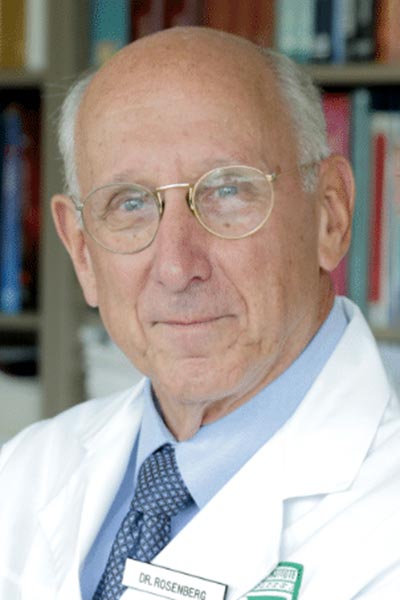Pezcoller Award lecturer will recount decades of milestones in the development of immunotherapy
Activating the immune system is an alluring therapeutic concept. A generation ago, immunotherapy was a dream so distant it didn’t even have a name. Today, turning patients’ own immune cells into living drugs that seek out tumors, destroy them, and make them disappear, is a reality. Steven A. Rosenberg, MD, PhD, FAACR, played a key role in that transformation.

Rosenberg will explore the slow, painstaking transition from dream to approved immunotherapies during the Pezcoller Foundation-AACR International Award for Extraordinary Achievement in Cancer Research Lecture. Rosenberg will present his one-hour lecture, Lymphocytes as a “Living Drug” for the Treatment of Cancer, at 12:15 p.m. CDT Sunday, April 10, in Great Hall BC at the convention center.
“We have had three main areas for cancer treatment over the last many decades—surgery, radiation therapy, and chemotherapy,” said Rosenberg, chief of the surgery branch at the National Cancer Institute. “We continue to make improvements in existing treatments, but they tend to be small improvements and over 600,000 Americans continue to die of cancer every year. Immunotherapy is going to have a huge impact on cancer treatment.”
Rosenberg’s research has morphed into multiple cancer therapies over the decades. In 1985, his lab described the use of interleukin-2 (IL-2) to treat cancer, an approach approved for metastatic kidney cancer in 1992 and for melanoma in 1998. IL-2 acts by activating the lymphocytes, a mechanism Rosenberg’s lab reported in 1985. He subsequently worked on Chimeric Antigen Receptors (CAR), which he reported in 2010. The first CAR-T cell therapy was approved in 2017, and several of them have been approved since then, to treat a variety of blood cancer types.
Rosenberg’s research career came into focus following two spontaneous cancer remissions he documented as a surgical resident in the 1970s.
“Those two patients—one with a metastatic gastric cancer that disappeared in the absence of treatment; one with metastatic kidney cancer inadvertently introduced during a renal transplant that disappeared when immunosuppressive drugs were stopped—told me that the immune system is capable of eliminating large, vascularized cancers in humans,” he explained. “It was a key lesson that the careful observation of patients can tell you a lot that isn’t in the textbooks or in the literature. Those two patients stimulated me to study the immune system, something I have continued over the next 40-plus years.”
The trajectory from observation to treatment was anything but direct. Multiple blind alleys had to be abandoned, while timely collaboration with other academic, public, and commercial groups developing novel technologies opened multiple bottlenecks, he said.
Through it all, Rosenberg said his research was centered around a single concept: Just as every cancer is biologically unique, so is each lymphocyte-based treatment. A single dose of anti-cancer lymphocytes may be more effective, and more cost-effective, than conventional off-the-shelf chemotherapy agents that typically send patients from one partially effective treatment to the next.
Lymphocytes can expand 1,000-fold within a week and persist for years.
“Our first IL-2 patient to respond is disease-free 30 years later,” he said. “We’ve had complete remissions of lymphomas, with many patients disease-free over 10 years later. Treatment using naturally occurring anti-tumor cells or genetically engineered anti-tumor cells holds enormous promise.”
[sub-post-content]
